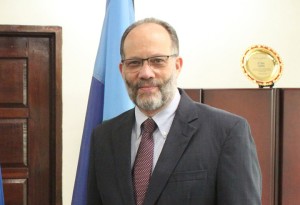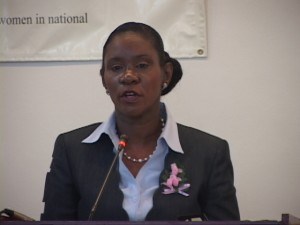As we in the Caribbean once again join the rest of the world in commemorating the United Nations designated International Women's Day, we are all especially aware of the historic significance of this particular celebration.
What International Women's Day 2000 must do for us is to bring sharply into focus, within the context of the Beijing Declaration and Platform for Action adopted at the Fourth World Conference on Women in Beijing, China in 1995, the progress made in this Region, as Governments seek to eliminate discrimination against women and strengthen protection of their human rights. One testimony of this is the enactment of domestic violence legislation across the Region which has already made significant impact on quality of life. Meanwhile, we are further encouraged by the continued success of women and girls as they are allowed to reach their potential in educational institutions.
But, unfortunately, this progress notwithstanding, indices still show that women in the Caribbean continue to bear the brunt of responsibility for social reproduction – housework and childcare – and for caring for all categories of vulnerable groups in our societies. They carry this responsibility even as they continue to predominate in low paying and low status jobs, and suffer from higher rates of underemployment and unemployment than their male counterparts.
In fact, later this year, the United Nations will be convening a Special Session on Women, at its Headquarters in New York, to review the implementation of the Beijing Declaration, and attendant Platform for Action, within the context of their design to guide gender-based reform wherever the need exists. In preparation for the UN Special Session, the Third Caribbean Ministerial Conference on Women held in October 1999, in Trinidad and Tobago, received a report on the Region's success level in implementing the principles of the Beijing Declaration and Platform for Action.
The Report celebrated the successes, but also presented the stark realities which continue to plague us, even as the Region embarks on a new century and seeks new modalities to meet new and emerging challenges.
The report noted, for example, that Caribbean women are being increasingly infected with the HIV virus. Since the higher prevalence of new HIV infection is among women in the 15-29 age group – the peak of a woman's child bearing years – the implications for future generations are naturally extremely worrisome.
And it is with much regret that I must again report that domestic violence continues to be the single most devastating factor which seeks to deprive women of full enjoyment of their human rights. While this concern, according to the Conference report, has galvanized governmental and non-governmental action like no other gender issue in the Caribbean, and has attracted increasing state resources, the problem of battering persists, and women and children continue to be at risk, too often to the point of real mortal danger.
Understandably, therefore, gender-based violence was accorded high priority for Regional action, and represented a key thrust of the Port-of- Spain Consensus which was adopted at the October 1999 Ministerial Conference in Trinidad and Tobago. Caribbean Ministers with responsibility for Women's Affairs agreed to address the root causes of violence against women, noting that policy and programmatic interventions should be based on an understanding of the nature and types of violence against women, and how this violence, in all its manifestations is constructed, perpetuated and reproduced.
The Port-of-Spain Consensus further highlighted the possible negative effects of such new phenomena as globalization and trade liberalization on women of the Region. At the Eighth Regional Conference on Women of Latin America and the Caribbean held in Lima, Peru, this February, this issue of monitoring the impact of the new trade and economic paradigms, was successfully negotiated into the Lima Consensus which emerged from that Conference.
This development means that Caribbean governments will now seek to ensure that their positions on the continuing issues of violence against women, poverty eradication, sexual and reproductive health and rights, as well as the emerging concerns, such as globalization and trade liberalization, are reflected in any internationally agreed documents which emerge from the UN Special Session on women.
I therefore take this opportunity to pay special tribute to the women of this Region for their achievements, and to commend their continuing resilience. Even as we concentrate our efforts on regional integration and action for greater prosperity, we must re-affirm our commitment to find resolution to these critical areas of vulnerability, so that we may move swiftly towards that future of gender equality, development and peace.





